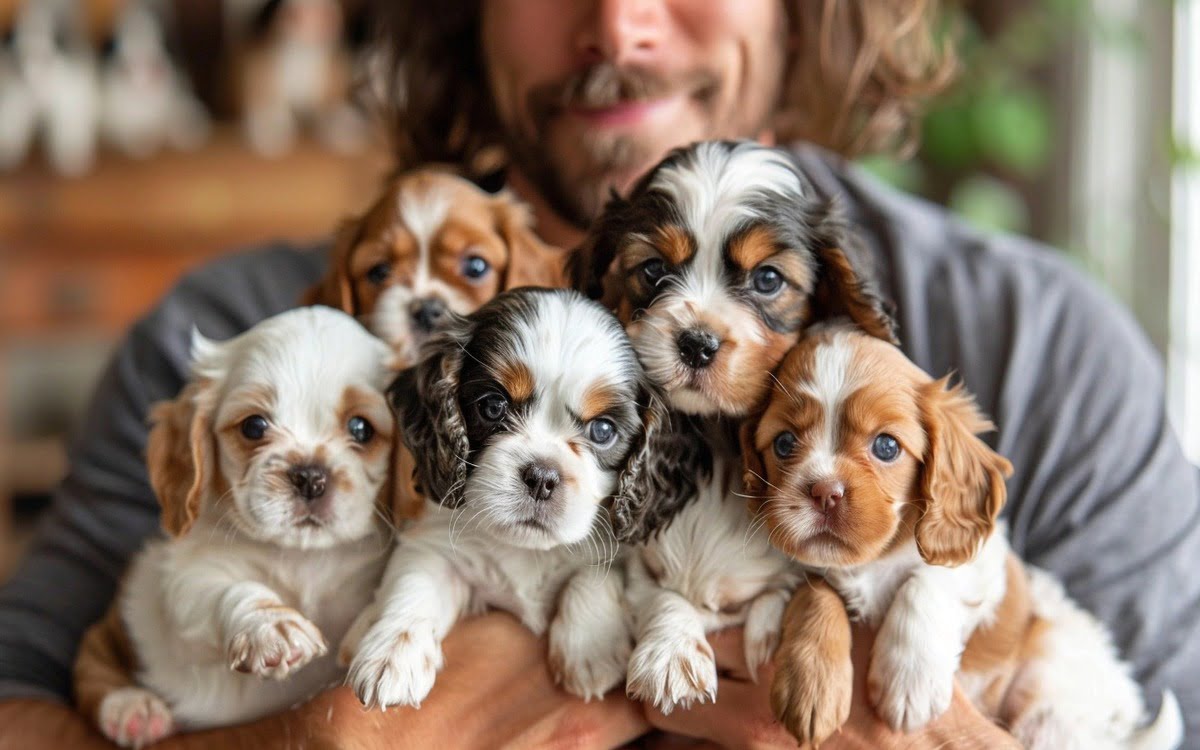Did you know that a Cavalier King Charles Spaniel named Dash once saved his owner’s life by detecting a gas leak in the middle of the night? These little dogs may look like pampered lapdogs, but don’t let their gentle looks fool you they’re full of surprises and unconditional love.
Introduction
If you’re considering bringing the joyful spirit of a Cavalier into your home, you’re in the right place! This guide will tell you everything you need to know about these sweet pups, from their fascinating history to what it’s really like to live with a Cavalier day-to-day. Think of it as your roadmap to a long, happy, and tail-wagging life with your new best friend.
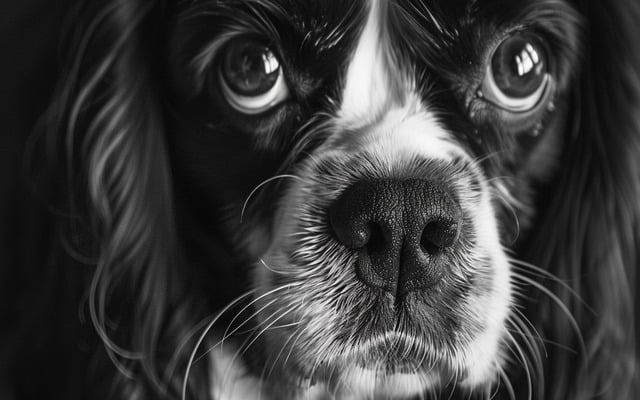
Unveiling the Cavalier’s Charm
Toy spaniels have graced the laps of royalty for centuries, but the modern Cavalier King Charles Spaniel is a breed with a fascinating comeback story. Back in the days of King Charles II of England, these small, silky-coated spaniels were all the rage. But over time, breeders favored spaniels with flatter noses, and the traditional look nearly disappeared.
Thankfully, in the early 1900s, a dedicated dog lover named Roswell Eldridge was determined to bring back these long-nosed, gentle-eyed spaniels. His efforts paid off, and in 1945, the Cavalier King Charles Spaniel was officially recognized as its own breed.
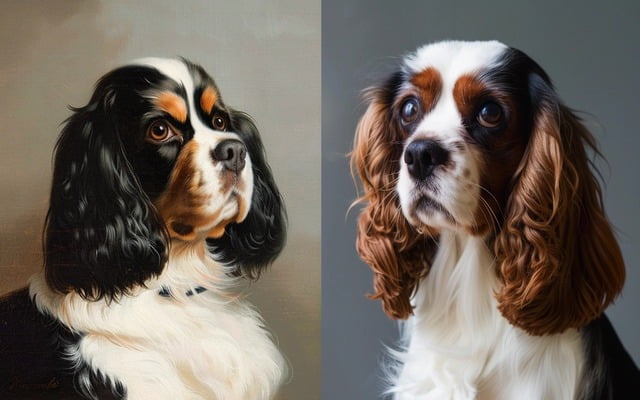
Personality & Temperament: A Heart Full of Love
If there’s one thing Cavaliers are known for, it’s their endless affection. These are dogs who live to love their people! They crave companionship and are happiest snuggled up with you on the couch or trotting by your side. Don’t be surprised if your Cavalier follows you from room to room – they just want to be part of the action!
Their sweet and gentle nature makes them wonderful family dogs. They’re generally patient with children and get along well with other pets, making them adaptable to all sorts of households. While Cavaliers are known for their laid-back personalities, they have a playful side too and enjoy a good game of fetch or a brisk walk.
A Look at Cavalier Health
Responsible Ownership Starts with Awareness
Like all dog breeds, Cavalier King Charles Spaniels are prone to certain health conditions. Some of the most common issues include:
- Mitral Valve Disease (MVD): A heart condition that affects many Cavaliers as they age. Early detection with regular vet checkups is key.
- Syringomyelia (SM): A neurological condition affecting the spinal cord. Reputable breeders screen their dogs to reduce the risk.
- Luxating Patella: A kneecap problem that can cause pain and lameness.
- Eye Problems: Responsible breeders check for conditions like cataracts and Progressive Retinal Atrophy (PRA).
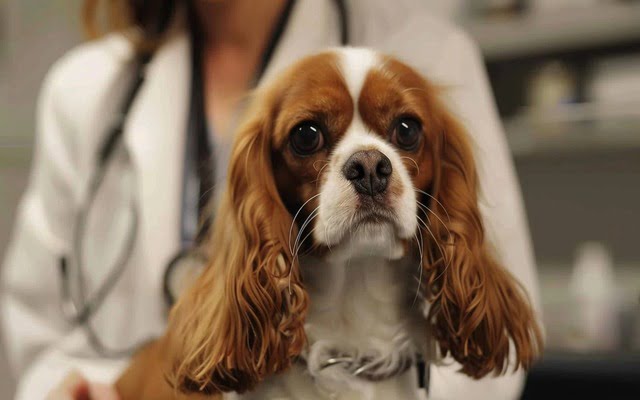
Keeping Your Cavalier Happy and Healthy
Regular vet visits are a must for all dogs, but especially for breeds with known health risks. Aside from vaccinations and checkups, here are additional ways to support your Cavalier’s well-being:
- Healthy Diet: Choose a high-quality food formulated for small breeds. Ask your vet for recommendations.
- Joint Support: Talk to your vet about supplements or gentle exercises, like hydrotherapy, that can support healthy joints as your Cavalier ages.
- Dental Care: Regular teeth cleaning helps prevent dental disease, which can contribute to other health problems.
Spotlight on Senior Cavaliers: Care for the Golden Years
As your Cavalier grows older, their needs might change, and that’s perfectly normal! Consider these tips for keeping them comfortable:
- Regular Wellness Exams: Twice-yearly wellness checks become even more important for senior dogs.
- Mobility Support: Non-slip rugs, ramps for furniture, or orthopedic dog beds make life easier if arthritis sets in.
- Mental Stimulation: Keep their minds engaged with puzzle toys, short walks, or learning new, simple tricks.
Life With a Cavalier
Welcoming Your Furry Bundle of Joy
Bringing a Cavalier puppy home is an exciting time! Here’s what to expect and how to set them up for success:
- Puppy-Proofing: Secure any potential hazards like electrical cords or houseplants before bringing your pup home.
- Socialization: Early exposure to other dogs, people, and different environments is crucial for a well-adjusted Cavalier.
- Crate Training: A crate is a safe haven and a great tool for potty training and preventing destructive chewing.
- Positive Reinforcement Training: Cavaliers are eager to please, making them wonderful to train! Start early with basic commands and reward good behavior.
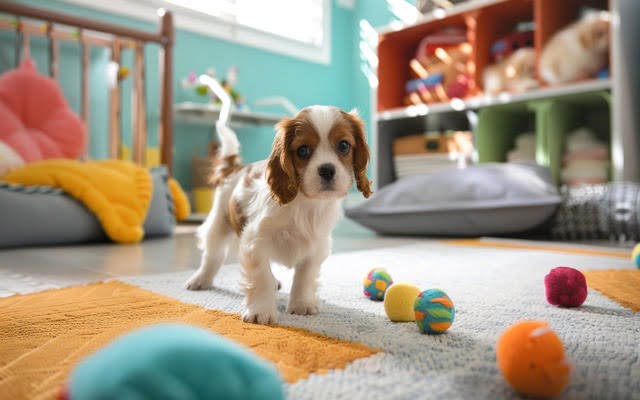
Adult Adventures: Routines, Exercise, and Playtime
Adult Cavaliers are adaptable companions who fit well into various lifestyles. Here’s a glimpse into a typical day with your Cav:
- Morning: A short walk followed by breakfast and a cuddle session before you head to work.
- Midday: Ideally, a potty break or a visit from a dog walker would be great for your Cavalier.
- Evening: An energetic walk, playtime, and dinner, followed by snuggles on the couch and relaxation.
- Mental Stimulation: Scatter kibble instead of bowl feeding, use puzzle toys, or teach them fun tricks to keep their minds active.
The Cavalier & Your Lifestyle: Finding the Perfect Fit
Cavaliers are incredibly adaptable, but here are some things to consider for the best experience:
- Apartment Living: Cavaliers do well in apartments, as long as their exercise needs are met.
- Families with Kids: These pups are typically great with considerate children. Always supervise interactions!
- Active Lifestyles: While they don’t need hours of exercise daily, Cavaliers enjoy walks, hikes, and playtime.
- Other Pets: Cavaliers generally get along well with other dogs and cats, especially when socialized early.
Unlocking the Cavalier’s Potential
Cavaliers Can Do More Than You Think!
Don’t be fooled by their size and gentle nature Cavaliers have a lot more to offer beyond just being adorable lapdogs. Here’s where they might surprise you:
- Agility and Dog Sports: Cavaliers are surprisingly athletic and can excel in agility, rally, and obedience trials. Their eagerness to please makes them a joy to train!
- Therapy Work: With their sweet and loving personalities, Cavaliers are natural therapy dogs. They bring comfort and joy to people in hospitals, nursing homes, and schools.
- Scent Work: Cavaliers have a good nose! Consider nose work classes or games to channel their sniffing abilities.
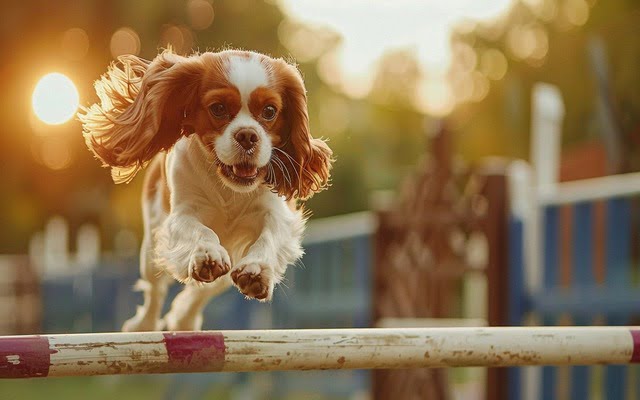
Cavalier Care Beyond the Owner: Pet Sitters & Daycare
Sometimes, life calls for extra help with your Cavalier. Here’s what to keep in mind when choosing care options:
- Breed-Specific Knowledge: Look for sitters or daycare facilities familiar with Cavaliers. They’ll understand their needs and potential for separation anxiety.
- Individual Attention: Smaller in home dog sitters or daycares with limited capacity might be a better fit than large, busy boarding facilities.
- Mental Stimulation: Ensure the sitter or daycare provides more than just walks playtime and enrichment activities are important!
DIY Enrichment Activities: Keeping Your Cavalier’s Mind Sharp
You don’t need fancy toys to keep your Cavalier entertained. Try these at-home ideas:
- Snuffle Mat: Hide treats in a snuffle mat or towel and let your Cavalier sniff them out.
- Food Puzzles: They come in all shapes and difficulty levels a fun and enriching challenge.
- “Find It” Games: Hide a favorite toy and encourage your Cavalier to search with a “find it” command.
- Teach a New Trick: Learning is great mental stimulation even simple tricks are fun!
A Bond Beyond Breed
Ethical Practices & Temperament Focus
Reputable breeders are passionate about Cavaliers and play a vital role in preserving the health and temperament of the breed.
- Interview Questions: Ask breeders about their health testing protocols, how they choose breeding pairs, and their commitment to responsible ownership.
- Highlighting the Value: A breeder interview showcases the importance of finding a Cavalier from an ethical source.
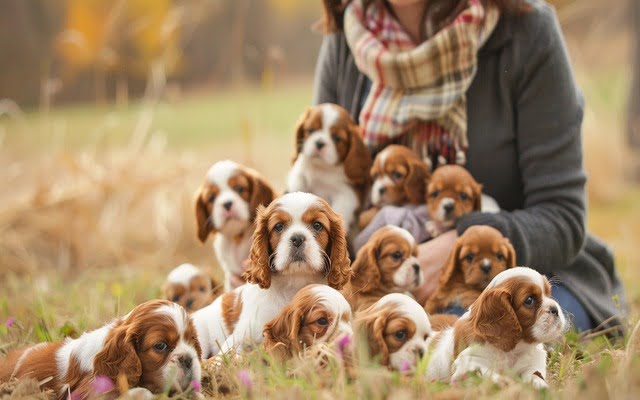
Cavalier Social Media & Online Groups: A Network of Support
The Cavalier community is vibrant online! Here’s why joining social media groups or breed-specific forums is beneficial:
- Advice from Experienced Owners: Get tips and support from fellow Cavalier lovers on any topic.
- Adorable Photos & Videos: Brighten your day with a dose of Cavalier cuteness on dedicated social media channels.
- Local Meetups: Some groups organize Cavalier playdates and events a great way to connect in person!
Cavalier King Charles Spaniel Rescues: Giving Love a Second Chance
Adopting a Cavalier in need is incredibly rewarding! Here’s why considering rescue is a wonderful option:
- Unique Personalities: You’ll find adult Cavaliers with their own lovable quirks and established personalities.
- Breed-Specific Rescues: These organizations understand Cavaliers and can help you find the perfect match.
- Making a Difference: You’ll be giving a deserving dog a loving home and opening space for another rescue.
Conclusion
You’ve now explored the history, personality, health considerations, daily life, hidden potential, and the amazing community surrounding Cavalier King Charles Spaniels. These dogs bring so much joy with their sweet nature, adaptability, and endless love. Remember, responsible ownership is key – choose a reputable breeder or consider adopting a rescue Cavalier in need.
FAQs
Are Cavalier King Charles Spaniels good with children?
Cavaliers are known for their gentle, affectionate nature, making them potentially great family dogs. However, it’s crucial to always supervise interactions between dogs and children. Teach children how to approach and play with dogs respectfully. Even the sweetest dog can become overwhelmed or startled.
Do Cavalier King Charles Spaniels have any unusual grooming needs?
The Cavalier King Charles Spaniel long, silky coat needs to be brushed regularly to avoid matting. Pay special attention to their ears! Cavaliers are susceptible to ear infections, so your veterinarian can recommend a specific ear cleaning solution and cleaning frequency to keep them healthy.
What’s the difference between a Cavalier King Charles Spaniel and a King Charles Spaniel?
Both breeds share a royal history! However, the modern Cavalier King Charles Spaniel was bred to have a longer nose, domed head, and larger eyes than the flatter-faced King Charles Spaniel.

I could talk about dog breeds all day! My goal is to help you find the four-legged friend who fits your life like a perfectly worn-in tennis ball fits in a dog’s mouth.

